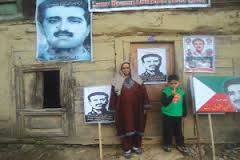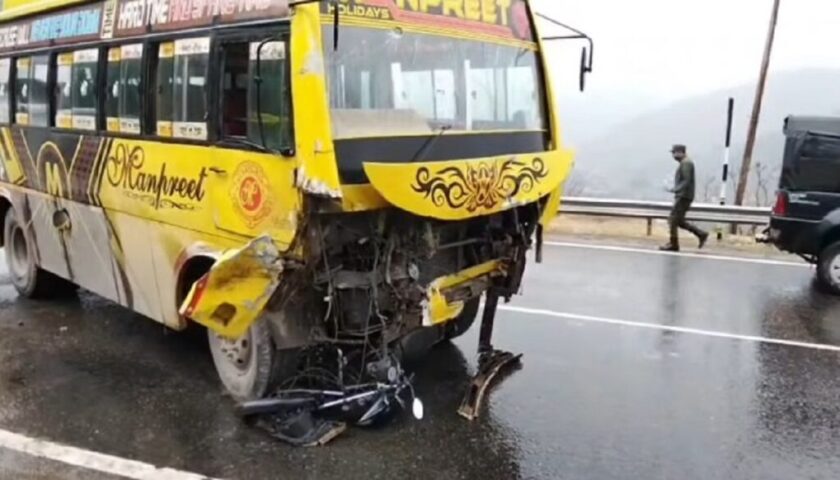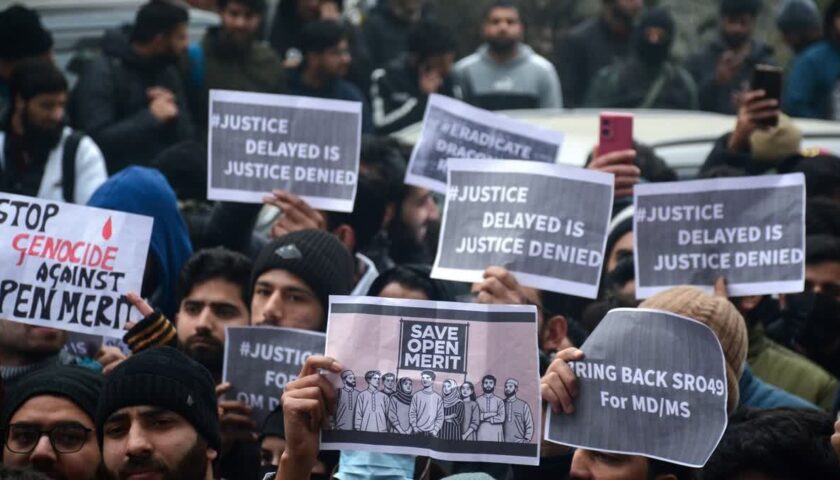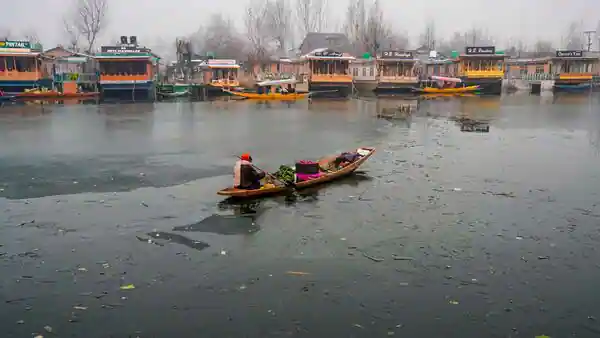 Authorities made heavy preventive deployments here and other places on Saturday following separatist-called protest shutdown to remember JKLF founder, Maqbool Bhat.
Authorities made heavy preventive deployments here and other places on Saturday following separatist-called protest shutdown to remember JKLF founder, Maqbool Bhat.
Heavy security deployment was made in district headquarters and towns to prevent protests called by the separatists on the death anniversary of the Jammu Kashmir Liberation Front founder.
Bhat was hanged in Delhi`s Tihar Jail on February 11, 1984.
The family and separatists have been demanding the return of his mortal remains from the authorities since.
Shops, public transport, other businesses and coaching centres remained closed throughout the valley.
Attendance in government offices, banks and post offices was also low due to non-availability of public transport.
JKLF chief Muhammad Yasin Malik was arrested on Friday here when he tried to lead a protest march. Malik was later shifted to Srinagar Central Jail.
Other senior leaders including Syed Ali Geelani, Mirwaiz Umar Farooq, Shabir Shah, Ashraf Sehrai and Nayeem Khan were also placed under house arrest.
Maqbool Bhat: The Initiator of the Kashmir’s Struggle
In order to pay homage to the initiator of the Kashmir’s struggle, the 11th of February is being celebrated as the martyrdom anniversary of Maqbool Bhat who was hanged by the then Indian regime on February 11, 1984 in Tihar Jail as the reprisal expressed by New Delhi. He was hanged to take the revenge of the killing of an Indian Diplomat by some unknown organization claiming to be Kashmiri. It was an act of shame for a country called India, as even after his death, his body was not handed over to his family and people, rather buried in Tihar Jail complex.
People and civil society of Jammu and Kashmir do respect him for his legendary struggle for the restoration of freedom in Kashmir. He is now a hero and pioneer of the Kashmiri nation.
So as to pay tribute to Maqbool Bhat, People of Srinagar have already built and reserve a grave for him in Martyrs Grave Yard of Eidgah, Srinagar. However, his formal burial is still awaited.
Maqbool Bhat, also known as Maqbool Butt was a Kashmiri freedom fighter and co-founder of the Jammu Kashmir Liberation Front. He was a leading voice of the struggle for freedom among the Kashmiris. In the year of 1962, Maqbool Bhat formed a movement called Kashmir Independence Committee (KIC). This group was later merged into the newly formed Jammu Kashmir Mahaz-Rayee-Shumari (Plebiscite Front) in Azad Kashmir, which was a crusade for complete independence from India. He was sentenced to death for murder by the Delhi High Court and hanged on 11 February 1984.
Prior to the publication of ‘Shaoor e Farda’ (the vision of tomorrow) by Saeed Asad and Safeer e Hurriyat ( the ambassador of liberation) by Khawaja Rafiq, there was little known about the events which shaped Maqbool Bhat’s life, struggle and Political thoughts. It appears from his letters written from various Pakistani and Indian prisons and interviews with various journalists at different times that life became a struggle from the age when children needed to be carefree and playing with their peers and toys.
His politics came into conflict with the state machinery of the Indian occupied Kashmir when he led several agitations for the political rights of the people of Kashmir. Subsequently, as it appears from his interviews and Rafiq’s narration confirmed by some his colleagues, he went underground and then in 1958 crossed over to Pakistan along with his uncle.
Maqbool Bhat got admission in Peshawar University to do Urdu Literature and joined a local newspaper ‘Anjaam’ to earn living. At Peshawar University, he met such people as Ahmed Fraaz, one of the big legends of romantic and radical or commonly called progressive Urdu poetry.
However, Maqbool Bhat formed Jammu Kashmir National Liberation Front (JKNLF) on August 13, 1965. Maqbool Bhat, Aurangzeb, Major Amaan Ulla and Kala Khan crossed the division line to the Indian-held Kashmr in June 1966. The purpose was to explore the feelings of Kashmiris there with the possibilities of forming some ‘cells’ there. It appears from the writings of such activists as F. Rehman who was among those contacted during the three-month tour of NLF guerrillas in different towns and cities that they managed to convince some people for national liberation type of armed struggle as the only way to liberate Kashmir.
Most of the Kashmiri record on the history of NLF and Maqbool Bhat shows that on their way back, they were intercepted by the Indian intelligence agencies and in a clash with one of the security teams Aurangzeb, who was from Gilgit, and the CID inspector Amar Chand was left dead. Maqbool Bhat and Kala Khan were arrested on September 14, September 1966.
Two First Information Reports were registered against Maqbool Bhat. The first one lodged at Police Station Sopore, Kashmir (F.I.R. 84/66) alleged that he crossed the ceasefire line without a valid legal permit with an illegal purpose to overthrow the lawfully established government of Jammu and Kashmir.
The second F.I.R. filed at Police Station Panzala, Kashmir (F.I.R. 38/66) charged Maqbool Bhat with the murder of Amar Chand. It alleged that Bhat and accomplices first took cash; ornaments and other documents from C.I.D. Inspector Amar Chand’s house then abducted and killed Amar. He was also charged with the enemy agent.
In his defence Maqbool Bhat denied all charges except that he had without a valid legal permit crossed the ceasefire line in June 1966. He said that he did not think it necessary to obtain a permit for moving around in his own country.
The biased Indian court found him guilty and passed death sentenced on him, while others were given the life sentence. It is also reported that upon announcement of the death sentence by Judge Neil Kant Ganjo Maqbool Bhat said, “The Rope has not yet been made that can hang Maqbool Bhat…if Indian authorities of occupation think that by hanging me, they can crush the Kashmir struggle. They are mistaken. The struggle actually will start after my hanging.”
Nevertheless, Bhat’s execution further contributed to the sense of alienation among most Kashmiris, and he continues to be a major source of inspiration for the Kahmiri freedom fighters. Bhat, like Afzal, was buried inside Tihar Jail. Kashmiri activists continue to demand Maqbool Bhat’s remains, and in fact, a grave is kept vacant in Srinagar’s martyrs’ graveyard for his mortal remains. He was the first Kashmiri to be judicially murdered on Indian soil-making him the first authentic martyr of the Kashmiri independence movement. His execution day is celebrated as Martyr Day every year.
By sacrificing his life, Maqbool Bhat played a key role in the struggle of Kashmiris, which has continued unabated, despite Indian state terrorism. He infused a new spirit into their movement. His martyrdom anniversary provides an opportunity to ponder over the fact that various countries of the world got independence by sacrificing their precious lives. On this vary day, the best way to pay homage to the pioneer of Kashmir’s struggle, Maqbool Bhat is that all the Kashmiris must renew their pledge to take the war of liberation to its logical end.




